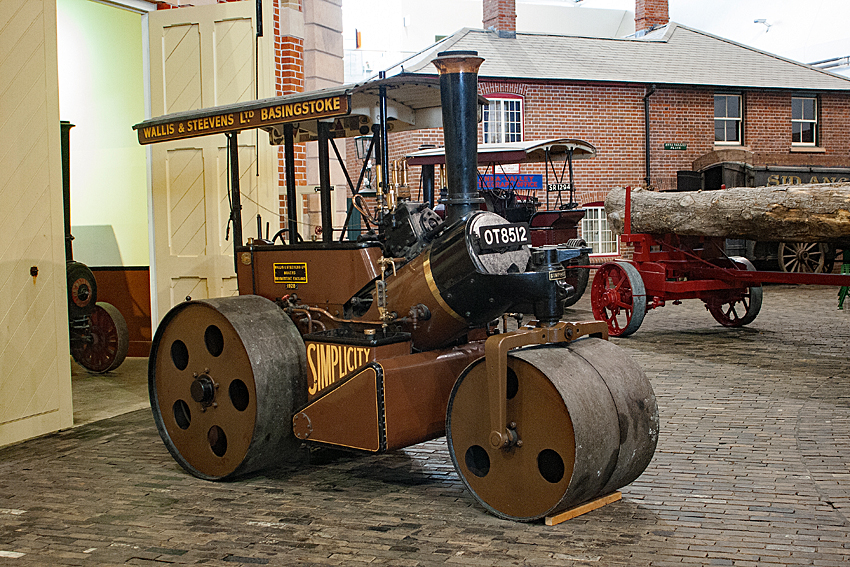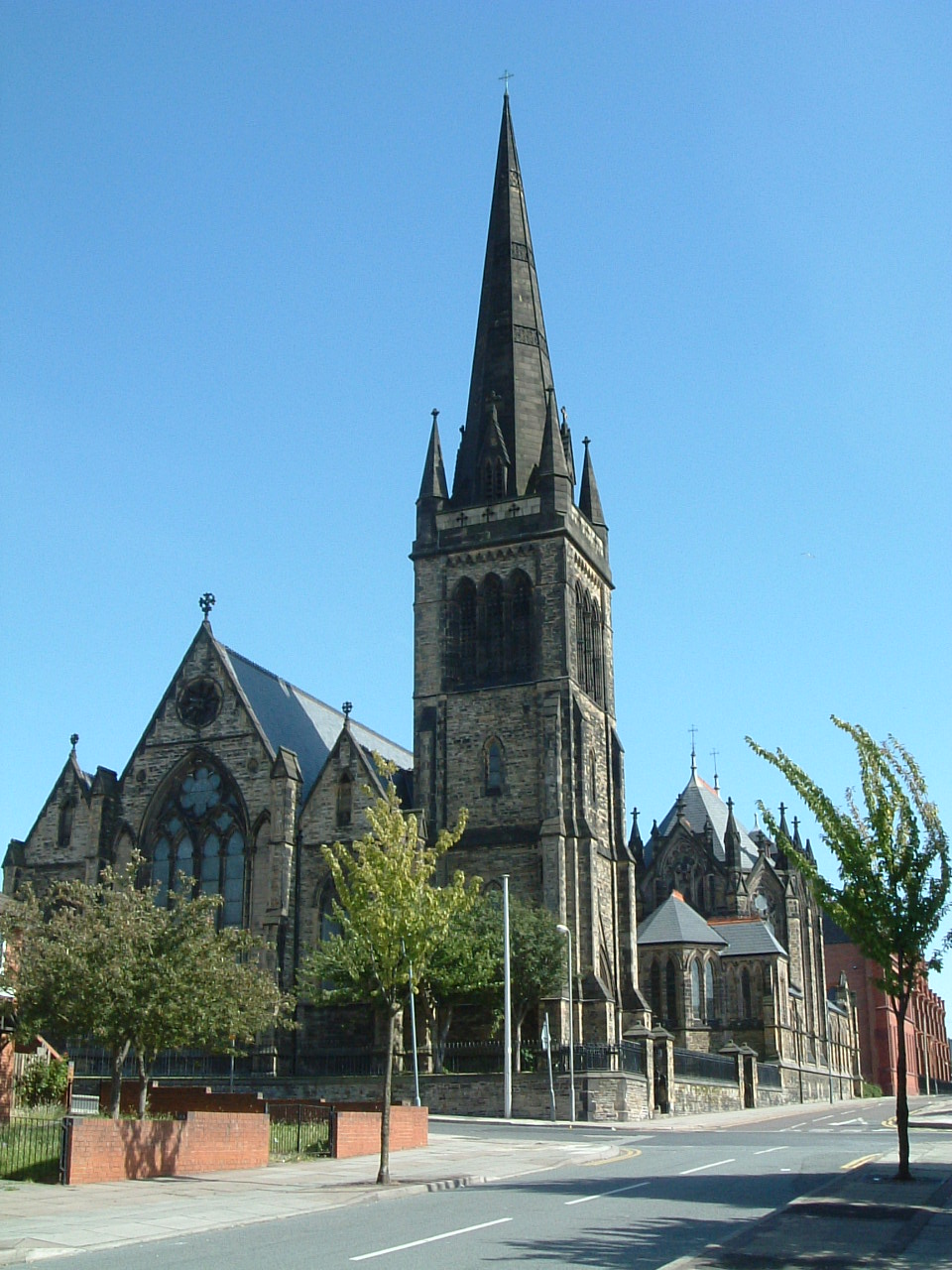|
Holy Ghost Church, Basingstoke
Holy Ghost Church is a Roman Catholic Church (building), church in Basingstoke, Hampshire, England. It was built from 1902 to 1903 by the priest and architect Alexander Scoles in the Gothic Revival style. It was named after the old ruined medieval Chapel of the Holy Ghost in the town. It is located on the corner of Chapel Hill and Sherborne Road, north of Basingstoke railway station near the town centre. According to Historic England, the church was "the last and best work" of Alexander Scoles. He is buried there and it is a Grade II listed building.Historic EnglandChurch of the Holy Ghost retrieved 27 May 2022 History Foundation From the early 1800s, priests came from Woolhampton to celebrate Mass in the Catholic Church, Mass in Basingstoke for the local Catholic population. In 1875, John Soper, a local non-Catholic dignitary, allowed for the current site of the church, next to the cemetery to be a Catholic church and school. In 1877, Holy Ghost Chapel and a schoolroom were opene ... [...More Info...] [...Related Items...] OR: [Wikipedia] [Google] [Baidu] |
Basingstoke
Basingstoke ( ) is a town in Hampshire, situated in south-central England across a valley at the source of the River Loddon on the western edge of the North Downs. It is the largest settlement in Hampshire without city status in the United Kingdom, city status. It is located north-east of Southampton, south-west of London, west of Guildford, south of Reading, Berkshire, Reading and north-east of the county town and former capital Winchester. According to the 2021 population estimate, the town had a population of 185,200. It is part of the borough of Basingstoke and Deane and part of the constituency#United Kingdom, parliamentary constituency of Basingstoke (UK Parliament constituency), Basingstoke. Basingstoke is an old market town expanded in the mid-1960s, as a result of an agreement between London County Council and Hampshire County Council. It was developed rapidly after the Second World War, along with various other towns in the United Kingdom, in order to accommodate ... [...More Info...] [...Related Items...] OR: [Wikipedia] [Google] [Baidu] |
Joseph John Scoles
Joseph John Scoles (1798–1863) was an English Gothic Revival architect, who designed many Roman Catholic churches. Early life and education Scoles was born in London on 27 June 1798, the son of Roman Catholic parents Matthew Scoles, a joiner, and Elizabeth Sparling. He was educated at the Roman Catholic school at Baddesley Green and then, in 1812, apprenticed for seven years to his relative, Joseph Ireland, an architect who was extensively employed by John Milner, then the Roman Catholic vicar-apostolic of the Midland District. Ireland built several Roman Catholic churches, one of the earliest of which was at Hinckley, in Nottinghamshire. He was probably advised on the Gothic detailing of these designs by John Carter.Eastlake 1872, p.130 Between 1816 and 1819 Scoles was resident at Hassop Hall, Bakewell, and in Leicester, superintending works for Ireland. Travel In 1822 Scoles left England in the company of Joseph Bonomi the Younger for further study. He carried out archa ... [...More Info...] [...Related Items...] OR: [Wikipedia] [Google] [Baidu] |
Roman Catholic Churches Completed In 1903
Roman or Romans most often refers to: *Rome, the capital city of Italy *Ancient Rome, Roman civilization from 8th century BC to 5th century AD *Roman people, the people of Roman civilization *Epistle to the Romans, shortened to Romans, a letter written by Paul, found in the New Testament of the Christian Bible *Ar-Rum (), the 30th sura of the Quran. Roman or Romans may also refer to: Arts and entertainment Music *Romans (band), a Japanese pop group *Roman (album), ''Roman'' (album), by Sound Horizon, 2006 *Roman (EP), ''Roman'' (EP), by Teen Top, 2011 *"Roman (My Dear Boy)", a 2004 single by Morning Musume Film and television *Film Roman, an American animation studio *Roman (film), ''Roman'' (film), a 2006 American suspense-horror film *Romans (2013 film), ''Romans'' (2013 film), an Indian Malayalam comedy film *Romans (2017 film), ''Romans'' (2017 film), a British drama film *The Romans (Doctor Who), ''The Romans'' (''Doctor Who''), a serial in British TV series People *Roman ... [...More Info...] [...Related Items...] OR: [Wikipedia] [Google] [Baidu] |
Gothic Revival Architecture In Hampshire
Gothic or Gothics may refer to: People and languages *Goths or Gothic people, a Germanic people **Gothic language, an extinct East Germanic language spoken by the Goths **Gothic alphabet, an alphabet used to write the Gothic language ** Gothic (Unicode block) * Geats, sometimes called Goths, a large North Germanic tribe who inhabited Götaland Arts and entertainment Genres and styles * Gothic art, a style of medieval art * Gothic architecture, an architectural style * Gothic fiction, a loose literary aesthetic of fear and haunting * Gothic rock, a style of rock music * Goth subculture, developed by fans of gothic rock Gaming * ''Gothic'' (series), a video game series ** ''Gothic'' (video game), 2001 **Gothic II, 2002 *** Gothic II: Night of the Raven, 2003 **Gothic 3, 2006 ** ''Gothic'' (upcoming video game), a remake of the 2001 video game Music * Symphony No. 1, or "The Gothic", Havergal Brian * ''Gothic'' (Paradise Lost album), 1991 * ''Gothic'' (Nox Arcana album), 20 ... [...More Info...] [...Related Items...] OR: [Wikipedia] [Google] [Baidu] |
Roman Catholic Churches In Hampshire
Roman or Romans most often refers to: *Rome, the capital city of Italy *Ancient Rome, Roman civilization from 8th century BC to 5th century AD *Roman people, the people of Roman civilization *Epistle to the Romans, shortened to Romans, a letter written by Paul, found in the New Testament of the Christian Bible * Ar-Rum (), the 30th sura of the Quran. Roman or Romans may also refer to: Arts and entertainment Music *Romans (band), a Japanese pop group * ''Roman'' (album), by Sound Horizon, 2006 * ''Roman'' (EP), by Teen Top, 2011 *"Roman (My Dear Boy)", a 2004 single by Morning Musume Film and television *Film Roman, an American animation studio * ''Roman'' (film), a 2006 American suspense-horror film * ''Romans'' (2013 film), an Indian Malayalam comedy film * ''Romans'' (2017 film), a British drama film * ''The Romans'' (''Doctor Who''), a serial in British TV series People *Roman (given name), a given name, including a list of people and fictional characters *Roman (surname), ... [...More Info...] [...Related Items...] OR: [Wikipedia] [Google] [Baidu] |
Grade II Listed Roman Catholic Churches In England
Grade most commonly refers to: * Grading in education, a measurement of a student's performance by educational assessment (e.g. A, pass, etc.) * A designation for students, classes and curricula indicating the number of the year a student has reached in a given educational stage (e.g. first grade, second grade, K–12, etc.) * Grade (slope), the steepness of a slope * Graded voting Grade or grading may also refer to: Music * Grade (music), a formally assessed level of profiency in a musical instrument * Grade (band), punk rock band * Grades (producer), British electronic dance music producer and DJ Science and technology Biology and medicine * Grading (tumors), a measure of the aggressiveness of a tumor in medicine * The Grading of Recommendations Assessment, Development and Evaluation (GRADE) approach * Evolutionary grade, a paraphyletic group of organisms Geology * Graded bedding, a description of the variation in grain size through a bed in a sedimentary rock * Metamo ... [...More Info...] [...Related Items...] OR: [Wikipedia] [Google] [Baidu] |
Parish
A parish is a territorial entity in many Christianity, Christian denominations, constituting a division within a diocese. A parish is under the pastoral care and clerical jurisdiction of a priest#Christianity, priest, often termed a parish priest, who might be assisted by one or more curates, and who operates from a parish church. Historically, a parish often covered the same geographical area as a Manorialism, manor. Its association with the parish church remains paramount. By extension the term ''parish'' refers not only to the territorial entity but to the people of its community or congregation as well as to church property within it. In England this church property was technically in ownership of the parish priest ''Ex officio member, ex officio'', vested in him on his institution to that parish. Etymology and use First attested in English in the late 13th century, the word ''parish'' comes from the Old French , in turn from , the Romanization of Greek, Romanisation of ... [...More Info...] [...Related Items...] OR: [Wikipedia] [Google] [Baidu] |
John Aidan Liddell
John Aidan Liddell, (3 August 1888 – 31 August 1915) was a British military pilot and a recipient of the Victoria Cross, the highest award for gallantry in the face of the enemy that can be awarded to British and Commonwealth of Nations, Commonwealth forces. Early life Liddell was born in Newcastle upon Tyne on 3 August 1888. He was educated at Stonyhurst College, Lancashire and Balliol College, Oxford, where he took the Honours Course in Zoology. Military career Liddell, not wishing himself "to be a slacker", joined the Officers' Special Reserve of the 3rd Battalion, Argyll and Sutherland Highlanders (Princess Louise's) of the British Army in 1912. He obtained his pilot's certificate in May 1914 and, following the outbreak of the First World War, the now-Captain (British Army and Royal Marines), Captain Liddell embarked with his battalion on 28 August for service in France. He spent 43 consecutive days in the trenches in command of the machine gun section and was awarded ... [...More Info...] [...Related Items...] OR: [Wikipedia] [Google] [Baidu] |
Dorothy Liddell
Dorothy Liddell, MBE (1890–1938) was a pioneering woman archaeologist and mentor to both Mary Leakey and Mary Eily de Putron. Early life Born Dorothy Mary Liddell to Emily Catherine Berry and her husband John Liddell at Benwell, England in 1890. She was one of six children born to the couple. Her father was a prosperous director of the North British and Mercantile Insurance Company and a Justice of the Peace first for Northumberland and later for Basingstoke. There were three boys and three girls in the family. The family moved several times and by 1898 were living in Prudhoe Hall. In 1904 the family moved to Sydmonton Cork near Newbury and then later in 1908 to Sherfield Manor, Basingstoke. The family were philanthropic and interested in their community where ever they lived. They were a very close knit family. Liddell was known as Dolly and Tabitha to her family. Tabitha was a character she had performed to entertain the convalescent soldiers who stayed in Sherfield Manor ... [...More Info...] [...Related Items...] OR: [Wikipedia] [Google] [Baidu] |


